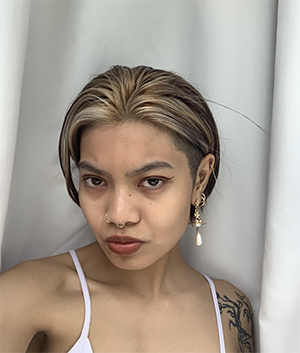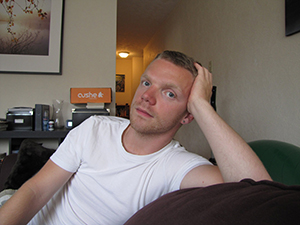The Body as Poem: Patrick Grace in Conversation with Louie Leyson

Louie Leyson, whose poems “all my friends in a room listening to say it right by nelly furtado,” “thank u rihanna part 2,” and “killing flies in late september” appear in The Malahat Review's summer issue #219, talks with Plenitude Magazine Managing Editor Patrick Grace about imbuing pop culture references in poems, the body as a conveyor of language, and punctuation as an instruction for breathing.
Read "all my friends in a room listening to say it right by nelly furtado" here.
Louie Leyson is a Filipino writer and UBC graduate who lives on the unceded territory of the Musqueam, Squamish, and Tsleil-Waututh Nations. You can find their work in Nat. Brut, The Malahat Review, Palette, Catapult, and others.
Your poems "all my friends in a room listening to say it right by nelly furtado" and "thank u rihanna part 2" draw inspiration from popular artists. Can you talk about how your interaction with music influences these poems?
With “all my friends in a room listening to say it right by nelly furtado,” it was very literal—I wrote the first few lines of the poem while in a room with my friends, and someone started playing Nelly Furtado’s “Say It Right.” Our shared, delighted recognition made a normal autumn evening into this magical, nostalgic moment where everything seemed to knit together; a blue-lit, tender atmosphere, a rare feeling of rightness. I listened to “Say it Right” on loop while writing the rest of the poem, because the song transports me now to that happy memory. But at the time, I hadn’t heard the song in years. Later I realized, when I did last hear it, I hadn’t met these people yet. I thought, growing up would’ve been easier if I knew these people for as long as I’ve known this song. That sentiment formed the emotional backbone of the poem—a bittersweet well of gratitude and wistfulness.
As for “thank u rihanna part 2,” my inspiration was more visual than aural: the indelible image of Rihanna in Margiela at the 2018 Met Gala, responding to that year's Catholic theme as a gorgeous, glittering pope. But I must have played Rihanna’s discography while writing the poem itself, including "Diamonds" from Unapologetic, hence: “trading all my human parts / for the kind of bright only / a diamond makes." I say “part 2” because I wrote a first part around Rihanna’s sheer Swarovski crystal dress from 2014, which can be read here on Nat. Brut. There’s also something camp and queer about imbuing pop culture references in poems, as Billy-Ray Belcourt illuminated for me last year. Rather than going for a universal sentiment of, this is an artist that anyone could recognize, I’m writing closer toward a queer experience of finding comfort and expression in pop culture figures, like Rihanna and Nelly Furtado, whenever comfort had been otherwise impossible to find, and direct expression of feelings was forbidden. Sad and wistful feelings, sure, but also feelings of love, friendship, and gratitude, which I think are sometimes fiercer for us than for others. Sometimes you need somewhere to put all that fierce love down. What better table than a song, or studded image of Rihanna?
The body is present in all three poems, from descriptions of "glossy tits" to "skinned... knees," "more glint than flesh" to "womb blood" and "umbilical cord jelly." Why are flesh and blood important to your work?
I’ve thought a long while on this question and how to answer it, because there's so much I want to say, but mostly it boils down to a view of the body as the poem’s most immediate access into insight on the world. If the poem is, arguably, our most intimate mode of communication, then we should tend to the body as the poem of our lives. Flesh is, after all, the conduit through which we experience the universe; there is so much that flesh tries to tell us. In Necropolitics, Achille Mbembe describes “a myth centred on the body." It’s a resistant, postcolonial mode, one that strips power from the signs and language of officialdom. The myth propels us to interpret the body as itself a conveyer of language, and if we listen closely enough, its inner workings could narrate the entire world outside of us.
We might take bodily affects like fatigue and sickness, for example, as imperatives delivered by the body's brilliant linguistic system; fatigue says I've expended too much of myself. It instructs me to lie down and rest. Pain tells me that something is wrong, maybe broken, and names the rupture’s location. I’m still learning to take these bodily imperatives seriously, to let them veto the abstract commandments of capital that tell us to otherwise ignore them. Maybe depression isn’t so much an ailment as it is our body’s way of telling us that something in the world is broken, that we should now tend to the wound.
When reading your poetry, I'm struck by a dreamy and domestic lilt, whether it be the comfort of friends and music in "all my friends in a room listening to say it right by nelly furtado," or the sweet haze of late summer in "killing flies in late september." Is this theme common in your writing?
Oh, yes. When I think of tenderness and domesticity in poetry, I think of Adrienne Rich’s Twenty-One Love Poems, and “Poem II," where she says: “I hesitate / and wake. You've kissed my hair / to wake me. I dreamed you were a poem, / I say, a poem I wanted to show someone..." But it’s bittersweet, because she’s writing about someone impossible for her to show, or to love openly, in the world that they live in. She has to dream up somewhere different to make up for that lack. A poem can be like that—a landscape you invent in which love is always possible. Sometimes I think that’s where my impulse to write comes from, that desire for someplace habitable. Houses for all the tenderness I can't express aloud.
Your poetry follows a pattern of tercets and quatrains, lending a nod to traditional form and structure, while turning tradition on its head by not using any capital letters. Can you talk about the juxtaposition between the formal structure and lack of capitalization? What does this deliberate break in traditional trend do for your work?
This is a very subjective reason, but mostly I leave out capitalization to keep a consistent flow in my head. Sometimes the capitalized letter at the start of a sentence or proper noun feels vaguely heavy or clumsy to me, prolonging an end stop’s break in rhythm maybe half a second too long, or severing it too thoroughly from the previous line. When I write in lowercase, punctuation imparts an instruction in breathing before grammar; I want some poems to feel like one intact exhale, minus the lung’s discomfort. The act of writing poetry is very sensorial, for me, and this is also a reason I return to the rhythmic consistencies of traditional form.
But I’m thinking now of Kim Addonizio’s “Sonnenizio” and Billy Collin’s “Paradelle,” both coolly transforming the rigidities of the sonnet and the villanelle, respectively, into a surprising source of play. In an essay, Anne Carson—whose distinct style also subverts classical form—refers to poetry as “the willful creation of error,” a phrase that I keep turning in my mind. I love the sentiment of poetry as willful error, even errors of grammar, out of which arise unexpected pleasure. It makes me think of Kintsugi, the Japanese art of mending broken pottery with ceramic and gold: temporally discordant. To preserve evidence of a fall, and then gild it.
Are you working on any larger projects right now?
Currently I’m compiling a chapbook of poems!
Tell us about your poetic influences. Are you reading anyone's work lately that inspires you?
I've been rereading the poems of Mary Szybist, from her collections Granted and Incarnadine. Her language carries such inimitable grace and warmth; when you read her, it's like she's weaving a blanket over you. I’m awed by her commitment to theme—the Annunciation, for example—without it ever feeling overdone or stagnant. Reading Incarnadine feels like looking at the Annunciation refracted through a kaleidoscope, each poem a colour in motion. She makes me want to challenge myself that same way, to try and write poems around a specific theme and still retain a sense of newness.

Patrick Grace
* * * * * * * *









